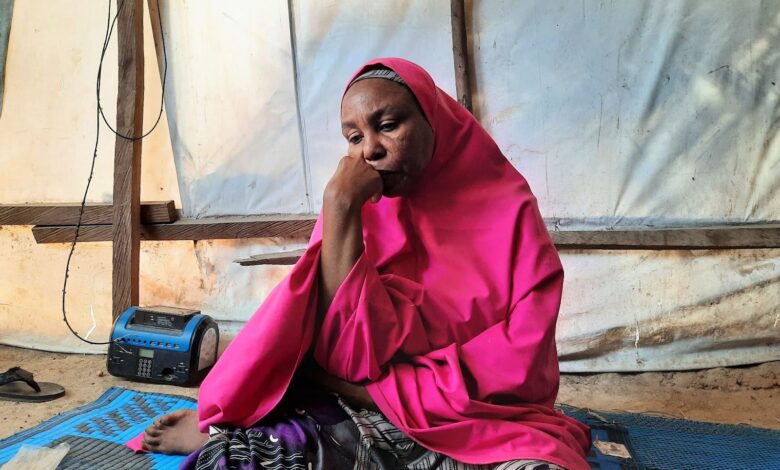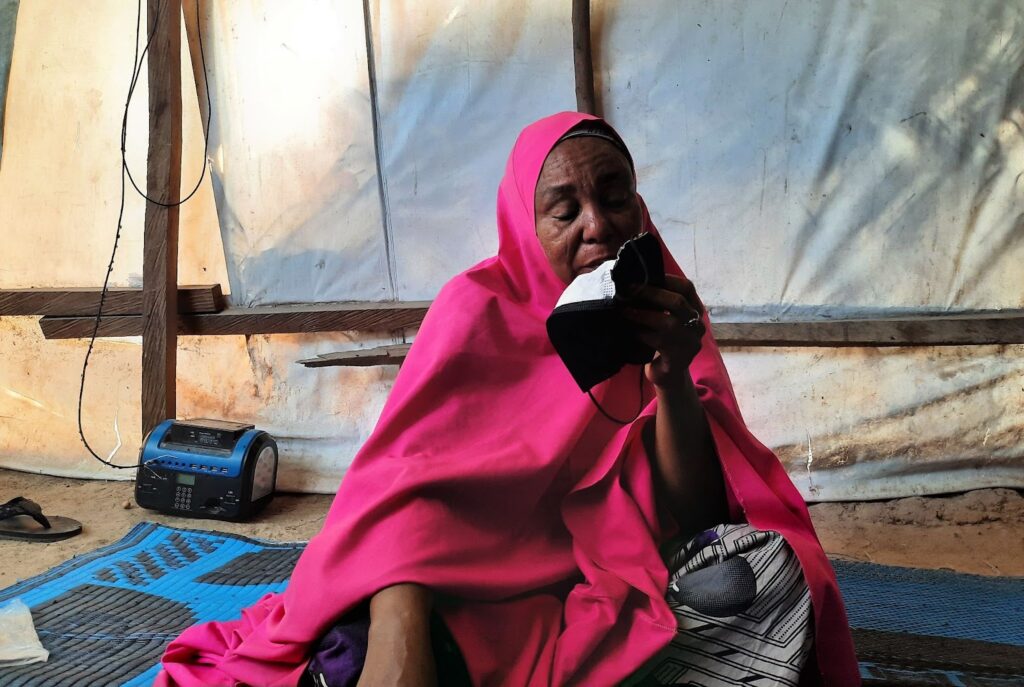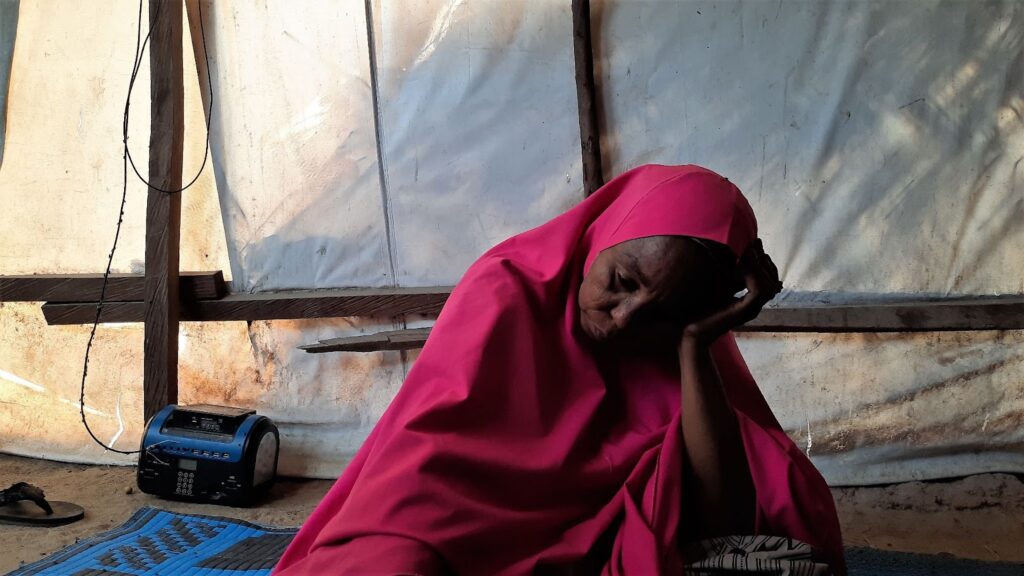Eight Years After He Went Missing, A Letter Came Bearing Good News. But It’s Not Enough.
From not knowing if he was dead or alive, to finding out he is in detention … somewhere, Alhaji Modu’s mother navigates through a turmoil of emotions.

Not long before the world went on lockdown in early 2020, Hajja Gana Muhammad, 60, received a letter that brought a glint of hope amid the gloominess of the time. The International Committee of the Red Cross (ICRC), a humanitarian organisation, wrote to let her know they had seen her son at a detention facility. They did not say which one.
Hajja Gana’s eldest child, 40-year-old Alhaji Modu, had gone missing in 2012 and in the eight years that followed, that letter was the first sign she would get, suggesting he was alive.
Back in 2012, members of the insurgent group Boko Haram still actively waged war in Maiduguri, the capital of Borno in Northeast Nigeria, before they got pushed to the fringes, forest areas, and surrounding communities. Hajja Gana lived in the heart of the city along Damboa Road with her seven children.
Although he was named Alhaji Modu, he has come to be known as Mamio, especially among relatives. This is because when they were children, whenever his junior brother tried to call him, that was all he could manage to utter: ‘Mamio’.
After graduating from secondary school, a local beans dealer employed him as a clerk. But patronage at the beans market started to reduce because of the insurgency. Customers from southern Nigeria stopped coming. His employers thought Mamio would be more useful taking bags of beans to sell down at the Alaba International Market in Lagos. And so started the 1,600km-long trips that took him to the opposite end of the country.
While Borno is one of Nigeria’s windows into the Sahara Desert in the North, Lagos borders the Atlantic Ocean in the South. Nigeria’s capital city until 1991 and a densely populated megacity, it hosts millions of migrants from other parts of the country seeking jobs or looking to do business.
Back in Maiduguri, 2012 was a heated period. It was three years after the violent uprising. The terror group had started to break into prisons, bomb police stations and military barracks, and conduct attacks across the North, including as far away as the federal capital Abuja.
“There was a lot of shooting. Soldiers and Boko Haram killed people, and the military used to arrest people anyhow,” Hajja Gana recalls.
One time when her elder brother died and a prayer service was held, she sent Umara, a young man who lived nearby, to deliver food to people. He went out with the food items and returned the first time. The second time, the only thing that returned was news of his arrest by the military.
“By 12 noon, an armoured tank came and took them to Giwa Barracks. Since that day, we know this one was in detention. Later, people in Gwange [a Maiduguri neighbourhood] went to enquire and they said if you didn’t see your people, they died.”
Meanwhile, Mamio continued to travel to Lagos. He told his family that the atmosphere there was calm. One time, still in 2012, he went, as usual, leaving behind a wife and daughter. But his family stopped hearing from him. He was still in Lagos when he last had a phone conversation with his mother. She has no idea if he was picked up there or on his way back to Maiduguri.
“What made us confused before is we called people at Alaba Market. They said they didn’t see him. We can’t say this is where he is. Just that we called, his phone number was not going through. We searched for him but didn’t find him until Red Cross brought us a letter saying he was in detention.”
Before she got the letter, Hajja Gana had imagined the worst. But her doubts have still not been cleared. She learnt Mamio had given the Red Cross his brother’s phone number and the name of his neighbourhood. They suspect he is being held at the Wawa military barracks in Kainji, Niger State.
The ICRC, which documents such cases globally, says there are over 24,000 people who have gone missing in Nigeria, especially due to the Boko Haram conflict.
Hidden from the world
Many families who spoke to HumAngle suspect that their missing loved ones were arrested by security agents. Thousands of people are, in fact, in detention facilities run by the Nigerian Army and the National Correctional Service. But because they are usually not allowed access to the outside world in violation of international humanitarian laws, they are presumed missing — or dead. Many can only confirm their family members are at these sites through former detainees who recognised them.
Detainees have been kept at these facilities for as many as seven years without trial too. But that is beginning to change. Between 2017 and 2018, over 1,600 detainees were tried for crimes, including offences under the Terrorism Prevention Amendment Act. Most of them were accused of providing “material and non-violent support” to terror groups.
“The proceedings were very short, with some lasting less than 15 minutes, raising several fair trial and due process concerns. Most charges were couched in ambiguous and vague terms without the crucial information Nigerian law requires, like the specific date, place, and details of the alleged offence,” noted the Human Rights Watch. Nearly half of the defendants in trials monitored by the group were either acquitted or discharged without trial.
The scale of these criminal trials is not enough to swiftly determine the fate of all those who have, for a long time, been detained indefinitely at various facilities. The authorities have blamed the pause in trials on an escalation of terror attacks and the COVID-19 outbreak.
Last January, Nigeria’s justice minister, Abubakar Malami, assured that the government would soon resume the prosecution of detainees, including those in Kainji. His ministry got approval to spend over ₦5.8 billion ($14 million) on projects related to prosecuting terrorism-related cases. But it is not clear how much progress has since been made.
Dr Umar Gwandu, the minister’s spokesperson, did not answer calls from HumAngle and has yet to respond to an enquiry sent via SMS.

During a chat with HumAngle, Army spokesperson Brig. Gen. Onyema Nwachukwu insisted that Nigerian counterinsurgency troops do not detain innocent civilians — only members of terror groups and those who support them.
He added that the process of detention is not shrouded in secrecy and all detainees are profiled in conjunction with other agencies, including the Department of State Services (DSS), Nigerian Correctional Service (NCoS), Nigeria Security and Civil Defence Corps (NSCDC), and “even a UN representative”.
“When we are saying these things, we should say it the way it is. We shouldn’t show any sympathy for those people,” he said.
“Once somebody is arrested, he is captured in the act of terrorism; the first thing they do is profiling, and then they conduct further investigation to ascertain certain things about the conduct, the act, to be able to put evidence together for prosecution. We are not the ones that prosecute at the end of the day. So if the man is in detention, it is not because we didn’t prosecute him; it is not our responsibility to prosecute.”
Asked why Boko Haram suspects detained by civilian prison authorities often have opportunities to write to their families, unlike those in military facilities, the Army spokesperson replied that he could not answer because the issue relates to the “security of those facilities”.
Still searching for answers
Hussein, a former detainee at the Kainji facility, had gone to Lagos too and was earning a living as a commercial motorcyclist when he was invited in 2014 and then detained indefinitely by the authorities. He told HumAngle last year how detainees were starved, shut out from the rest of the world, had to drink their urine, could not bathe for many weeks, and died in their hundreds. The conditions, however, improved with visits from Red Cross officials who came with food supplements.
The ICRC, which has rare access to various detention facilities, states that it aims to secure humane treatment for detainees. It also tries to support the families by restoring communication between them and detained relatives.
“I have gone to the Red Cross office several times, but they couldn’t tell me his whereabouts; they said we should go and pray: ‘Maybe you will hear from him soon,’” a disappointed Hajja Gana says.
“They said they only got the phone number and know he is alive, but they can’t help us. They said he told them his people did not know whether he was dead or alive. And we know he is not Boko Haram; how can they arrest him?”
Robin Waudo, ICRC’s communication coordinator in Nigeria, told HumAngle he would not be able to confirm details about how they operate because discussions with the authorities and families of detained persons are confidential.
“This confidentiality is key to ensuring a constructive and protective longer-term engagement that aims at reducing the suffering of the concerned victims,” he explained.

Hajja Gana struggles to support Mamio’s young wife, Ya Fusam; his daughter, her namesake 10-year-old Hajja Gana; and her own children. She sells moin-moin and other food items to fend for the family.
“His father is dead. I am the one managing to give them food,” she says, snivelling softly as she repeatedly mops her eyes with a face mask. “I am the one managing to support the family. When I leave here, I will go and buy rice and go home with it. The father died of hypertension two years ago. He was thinking of his son,” she continues, between tears.
Being the eldest child, Mamio was a pillar of support to the family before his disappearance. “All of us are feeling the pain. He was kind to us and to other people in our locality. He has been good since he was a child, that people are even surprised that he was arrested.” Hajja Gana looks defeated as she speaks and says she feels sad anytime she thinks of him.
If he was a bad person, she observes, not only would people have blamed her for how he turned out, but they would also openly mention his flaws in the market and other public spaces.
She describes him as slim, tall, fair-skinned, and without tribal marks. He resembles her, she says, so much that when you see one of them, it is almost as if you have seen the other.
She remembers how he occasionally went out with his football to play after returning from the market — or sometimes early in the morning.

The letter from the ICRC is not enough to reassure Hajja Gana that all is well with her son.
She feels disconnected from the government, which has not provided a reliable platform for people like her to get information about their missing loved ones. It was only last September that the National Human Rights Commission (NHRC) launched a missing persons register with a focus on Borno State, but updates about the project are scarce.
“Who are the government?” Hajja Gana asks softly. “Where can we go to meet and complain to them that this is what is happening? Nobody knows. We only hear the name. It’s just that we heard from the Red Cross, and even with that, we are not sure. They should tell us their whereabouts.
“Always we are praying that he will come,” she says, raising both palms to reveal a white digital tasbeeh on her right index finger. “Always, I am expecting.”
This report was produced in partnership with the Open Society Initiative for West Africa (OSIWA) under the Missing Persons Register’s Population and Amplification Project.
Support Our Journalism
There are millions of ordinary people affected by conflict in Africa whose stories are missing in the mainstream media. HumAngle is determined to tell those challenging and under-reported stories, hoping that the people impacted by these conflicts will find the safety and security they deserve.
To ensure that we continue to provide public service coverage, we have a small favour to ask you. We want you to be part of our journalistic endeavour by contributing a token to us.
Your donation will further promote a robust, free, and independent media.
Donate HereStay Closer To The Stories That Matter




